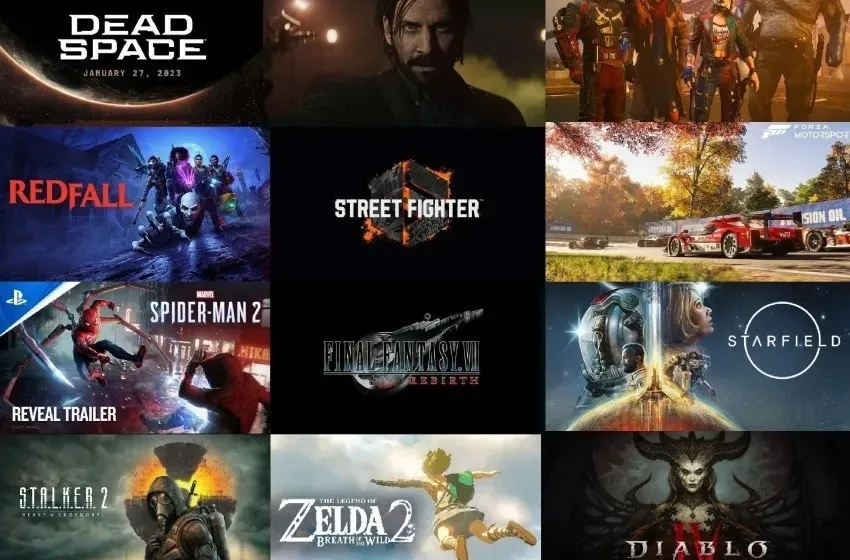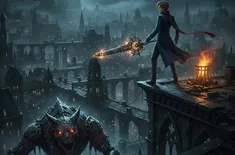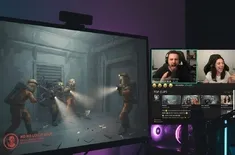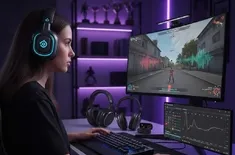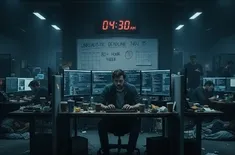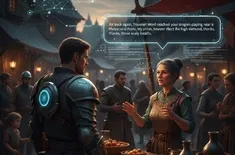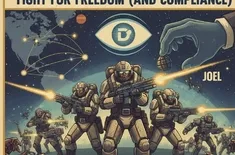From the bug-plagued Redfall to the tiresome Secret Invasion, 2023 hasn't all been great.
Video games and films have had a decent run this year. Baldur’s Gate 3, The Legend of Zelda: Tears of the Kingdom, and Alan Wake 2 kept us entertained at home, while Oppenheimer, Barbie, and John Wick: Chapter 4 drew us into cinemas. But amidst the successes, there were some letdowns that still linger in our minds.
Some of the top-tier companies in both industries had their share of unfortunate moments this year, notably Bethesda in video games and Marvel in film and TV. From Bethesda, we witnessed Starfield, which failed to deliver the anticipated open-world space epic, while Redfall turned out to be a major letdown by all measures. Marvel’s premieres like Ant-Man and the Wasp: Quantumania and Secret Invasion also left us underwhelmed, but the overarching lack of direction in the Marvel Cinematic Universe's Phase 5 is what really got us down.
Not everything on this list is inherently bad; we’re looking at releases that simply didn't live up to their potential. Whether due to unfulfilled promises, an overflow of similar content, or other reasons, these are the eight most disappointing aspects of 2023.
Starfield
Apart from Tears of the Kingdom and Grand Theft Auto 6, it’s tough to recall a more eagerly anticipated game than Starfield in the last decade. The studio known for The Elder Scrolls and Fallout set out to create a space epic with extensive customisation options, a gripping narrative, immersive role-playing mechanics, and an entire universe to explore. The hype was real, fueled further by multiple delays, and considering it came from the same studio keeping The Elder Scrolls 6 at bay for years, it had to be sensational.
But Starfield fell short. It's not terrible, offering hours of entertainment for most players, but it pales in comparison to Bethesda’s other games. Players found it lacklustre, criticizing its vastness over depth. Especially when stacked against some of 2023’s other heavy hitters, Starfield felt somewhat uninspired.
Baldur’s Gate 3 set a new benchmark with its unprecedented player customisation and choice in RPGs, while Cyberpunk 2077: Phantom Liberty delivered thrilling cinematic storytelling. Starfield felt like a relic of the past compared to these games, almost as if Bethesda had been out of touch since Fallout 4’s launch in 2015, waking up only to find the genre had moved on.
The Marvel Cinematic Universe
Phase 4 of the Marvel Cinematic Universe faced some leniency as it followed Avengers: Endgame, the epic conclusion of an 11-year saga. The lack of coherence across films like Black Widow, Eternals, Moon Knight, and others was pardoned, assuming Disney was laying the groundwork for another grand Avengers moment in Phase 5. At least, that's what we thought.
A year into Phase 5, Disney released Quantumania, Guardians of the Galaxy Vol. 3, Secret Invasion, Loki Season 2, The Marvels, and soon, What If..? Season 2. Yet, there’s no real cohesion among these titles, unlike how every film in the first three phases built towards their subsequent Avengers finales. While there's a vague connection in some involving Kang the Conqueror, his actor, Jonathan Majors, faced legal issues and was dropped by Marvel, derailing Disney's plans.
The surge of mostly mediocre MCU entries that began in Phase 4 has persisted in 2023, leaving many fans doubtful that Marvel can reach the heights of Avengers: Infinity War and Endgame once again. Despite the usual ups and downs in the MCU, Disney’s mounting releases of intertwined content demand increasing attention and commitment. Phase 1 lasted 12 hours and 24 minutes in total; Phase 4 stretched for 54 hours and 40 minutes. Even Disney CEO Bob Iger acknowledged that the volume of shows has “diluted focus and attention.” However, rectifying this issue might be too little, too late.
PlayStation VR2’s Launch Line-Up
The PlayStation VR2 headset marked a significant upgrade from Sony’s initial venture into virtual reality, albeit at the expense of the price accessibility of the original. Nevertheless, with a 4K HDR OLED screen, specially crafted controllers offering haptic feedback, and a lightweight design, IGN applauded the PSVR2 in our 9/10 review, stating it set a new benchmark for console VR gaming.
However, only a handful of its exclusive games have matched that standard. The headset launched with over 40 titles, but merely four were exclusive: Horizon Call of the Mountain, Fantavision 202X VR, Gran Turismo 7 VR, and Resident Evil Village VR. While the latter two were commendable, Horizon and later exclusives like The Dark Pictures: Switchback VR were good but not exceptional.
In reality, PSVR2 boasts just 10 exclusives in total, counting the year-end surprise of Resident Evil 4 Remake VR. Yet, this also brought disappointment; Capcom’s usual proficiency in adaptations, coupled with the brilliance of Resident Evil
The Flash
Confidence in the DC Extended Universe had, by the time The Flash was released, already taken a hit. Nevertheless, this one held promise. The fusion of DC characters brought Ezra Miller’s Flash together with Michael Shannon’s General Zod, Michael Keaton’s Batman, Gal Gadot’s Wonder Woman, and many more in what could have been DC’s version of Marvel’s Spider-Man: No Way Home.
However, it turned into a CGI-filled cameo extravaganza that, while not necessarily poor, left many fans unsatisfied. The Flash could have paid an incredible tribute to DC's cinematic history and been a fitting farewell to the problematic shared universe, but instead, it became a quick montage of shallow fan service. Cameos by Ben Affleck and Adam West’s Batmen, along with George Reeves’ Superman and even a deep-cut Nicolas Cage reference, were fleeting and the movie lacked substance.
The Flash was anticipated to offer a smooth transition to the new DC film universe (the DCU) in a clear and thematically consistent manner, but it fell short. An event akin to Flashpoint in the DC comic universe reset things in 2011, and while a similar event happened in The Flash, it left itself open for another cameo teaser at the end, likely leading nowhere. Thus, the film missed an opportunity to give the DCEU a dignified exit, only adding confusion to the upcoming revamp. Aquaman 2, your turn to shine...
Secret Invasion
The MCU’s TV offerings faced a shaky phase, with most shows barely making a mark beyond occasional highlights like WandaVision and She-Hulk: Attorney at Law. Disney needed a hit to kick off 2023, and Secret Invasion seemed perfect—a no-nonsense, six-episode series based on a beloved Marvel Comics story. It had a star-studded cast including Samuel L. Jackson, Emilia Clarke, Olivia Colman, and Don Cheadle.
But somehow, that potential translated into an utterly mundane and monotonous MCU entry, far from its source material. The Secret Invasion comic had a similar premise, with Skrulls infiltrating Earth by impersonating various Marvel heroes and figures. Yet, the comic maintained true mystery, suggesting any Marvel superhero could be a Skrull (and indeed, several were). Comparatively, the Skrulls in the Disney+ show peaked at James Rhodes and included other characters most people hadn’t heard of.
Secret Invasion emerged as a thriller lacking in thrills, an espionage show with little mystery, and an MCU entry missing the vibrant colours and charm of Marvel.
Redfall
Redfall faced a similar predicament to Starfield as one of the initial Xbox exclusive games from Bethesda. While Starfield was developed by the studio behind The Elder Scrolls and Fallout, Redfall came from Arkane, known for Dishonored, Prey, and Deathloop. That was a strong foundation, and when Redfall was announced as a stylish, cooperative game centered on defeating extravagant vampires, it generated genuine excitement.
However, while Starfield disappointed for being good but not great, Redfall was simply bad. It encountered everything that could go wrong—criticisms for bland missions, uninspiring combat, poor AI enemies, terrible performance, numerous bugs, a weak storyline, a mandatory online requirement, and more.
Post-launch support was sluggish. Arkane took over a month to release the first substantial patch for Redfall, and even the Xbox Series X version didn’t support 60 frames per second until October, five months after its release. Additionally, a subsequent patch that introduced a new sniper rifle instead of addressing highly requested features further irked fans. Redfall's heavy dependence on online gameplay doesn’t bode well for its future, with its player count on Steam dwindling to around 1% of its launch numbers.
Call of Duty: Modern Warfare 3
Call of Duty often faces criticism as one of the biggest video game franchises around. However, the faux criticism of Activision recycling the same game annually rang true with Modern Warfare 3. It reportedly began as an expansion of Modern Warfare 2 but was spun into a full release in just 18 months. The PlayStation 5 version also lacked a Platinum Trophy.
Accompanied by logistical frustrations, the gameplay itself was uninspired. Activision forced its usually well-designed game modes like Campaign and Zombies into the maps of battle royale Call of Duty: Warzone. Modern Warfare 3 fell short, with the single player feeling "underbaked, rehashed, and cobbled together from multiplayer parts," as stated in our 4/10 review.
Even the premiere multiplayer mode was disappointing. Activision seemed to rely on nostalgia by including classic Modern Warfare maps like Highrise and Rust. But the game lacked any substantial advancements, and its changes, such as a slowed-down progression system, only led to further disappointment.
